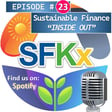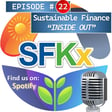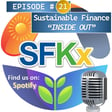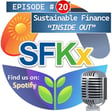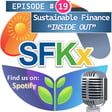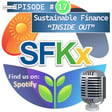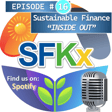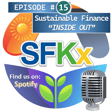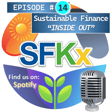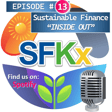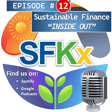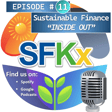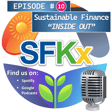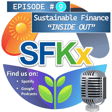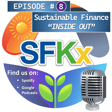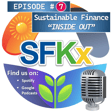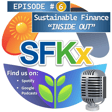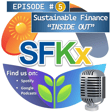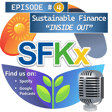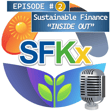Become a Creator today!Start creating today - Share your story with the world!
Start for free
00:00:00
00:00:01

SFKx Podcast Ep. 3 - Sustainable Finance "Inside Out"
Transcript
Introduction to Sustainable Finance Podcast
00:00:09
Speaker
Hello and welcome again to the third edition of Sustainable Finance Inside Out podcast. So here we are at number three with a bang. And just in case you didn't already know, we strive to bring you simply the best and most relevant news, events that's going on, major breakthroughs and key concepts covering all the happenings in sustainable finance as the world funds itself to the all important net zero. We hope you like our podcast. Please check us out at sustainablefinancekx.com.
00:00:38
Speaker
on Twitter. Well, I think it's called X these days now and LinkedIn and all the usual socials.
SF Guru and Listener Milestone
00:00:43
Speaker
So without further ado, we're going to kick off to SF Guru. SF Guru, please take us through the recent news and developments. Yeah. Hi, SF DJ. Good morning. Good evening. Good afternoon. And any other time, time or greeting or salutation to our
00:01:01
Speaker
to our listeners right across the world. We've nearly hit 100 listeners across our three episodes so we're looking to really ramp up and we'll be on all major podcast platforms pretty soon and hopefully this time you can hear our funk air music to bring us into the podcast.
00:01:22
Speaker
Anyway, absolutely. So look, let's get straight
Climate Bond Institute Report Highlights
00:01:26
Speaker
to it. So a couple of things on market volumes. Look, last podcast, we talked a lot about some of the second quarter numbers, some of the first quarter numbers. So I just want to reiterate through a more detailed report, and we'd highly recommend that our listeners check that out from the Climate Bond Institute. CBI bring out a lot of really good
00:01:46
Speaker
very frequently, so do check those out. So a couple of things from their latest report about H1 2023 numbers.
00:01:54
Speaker
GSS or global green sustainable social debt crossed the cumulative 4 billion, I should say 4 trillion mark, which is great. But it pales in the significance when you or insignificance, I should say, when you look at the total fixed income market globally of approximately 100, 100 trillion. So
00:02:17
Speaker
a lot better than it was, but still a long way to go.
Sovereign Issuance and SLB Volumes
00:02:23
Speaker
One of the interesting aspects of it was, if you look closely at the numbers, the sovereign issuance I think is more than it was the whole of 2022 already in 2023. So some really strong issuance growing there. What we're sort of saying through the numbers, like what we said last episode, green continuing to solidify on and anchor the market on the
00:02:44
Speaker
Use the proceeds side social under pressure sustainability is the process yet mix mix volumes there and transition as a direct label instrument not too much on that side except for what's out of japan and then the slb numbers a little bit up and down started really strong.
00:03:03
Speaker
Then we had some jitters globally from economics and banks and other things in about February, so a little bit sort of jittery and a little bit more patchy, you could say. We're not going to go through all the really specific things on the H1 numbers, but we do recommend people do check those out and that'd be the broad brush.
00:03:21
Speaker
I think the most interesting aspect of those numbers that have come out is really that SLB spottiness that you will see again a pretty good start. I think there's been some more quality deals done this year but really quite patchy and let's just see how that sort of pans out over the
00:03:42
Speaker
over the year but if you look at first half slb volumes or link bond volumes about forty close to forty billion and that's a reduction both by volume and by deal count of that thirty percent versus last year so again much more open to judgment calls and views and we'll see how that we'll see how that goes.
Market Health and Regional ESG Perspectives
00:04:03
Speaker
Moving right along, I like the article from ING about sustainable finance remaining in rude health, and I think that's right. Once you overlay, there are some softer parts of the market, but once you overlay the linked loan aspect of the market, those numbers, whilst hard to get, should be pretty positive. A number of other institutions come out with different thoughts about where the market's going and how much we're going to do at the end of the year.
00:04:28
Speaker
We like to just think about it in terms of broad brush context. There's lots of ongoing support for sustainability. Hence, sustainable finance is really just a tangible way to link that strategy to funding initiatives.
00:04:44
Speaker
What else have we got going here? The anti sort of ESG movement, which we'll talk a little bit more about probably as we keep going and ramp up to the US sort of election cycle, that ongoing weaponization if you like. Some more interesting reports from Bloomberg coming out on that. If you look at it,
00:05:02
Speaker
What really struck me was that European companies see ESG more as a opportunity, whereas US companies see ESG more as a risk factor. So that's pretty interesting. And I think when you look behind some of the numbers of proxy voting and all those type of things, you can see that there's often very little support.
00:05:26
Speaker
For some of the support for some of the climate proposals by by other by other proponents i guess there's still a lot of support what i should say i got tangled in some words there is a fair amount of positivity still coming through that so,
00:05:44
Speaker
You know what you see in the papers what you see in the politics i don't think this is catching on anywhere else in the world but i do think the language we're gonna start to use will start to change i think the word or acronym is just gonna be very loaded. Politically loaded and will start to just talk sustainability which is the broader umbrella in any case so.
00:06:05
Speaker
I say let's just get on with it and not get too concerned about what exact wordings or acronyms we're using. We know it's part of a megatrend and not just a three-letter acronym that's a fad. What else should we look at here? I guess sort of connected to that in some ways was the little bit of a surprise that S&P dropped their ESG scores from their credit ratings. They used to have like a shading after the credit rating.
00:06:33
Speaker
Whether that's a reaction to some of these sensitivities going on in the US, S&P being a US company, I don't actually know. We might see more of this. I don't think it heralds the end of ESG under sustainability. I just think it means that some companies are going to be a little bit more cautious about the
00:06:52
Speaker
the wording and about the positioning of some of these things and let's see how that goes. I haven't seen any of the other agencies do the same thing and they've got different ways of measuring and shading and including ESG in their assessments in any case.
00:07:09
Speaker
All right, moving right along, let's have a look at some of the new things that come out, or not so much new, but ongoing acronyms just oozing out of the EU.
EU Corporate Sustainability Reporting
00:07:22
Speaker
The CSRD, the Corporate Sustainability Reporting Directive, I think, was adopted finally in the EU. Basically, that just captures an absolute shedload of companies that get caught under a disclosure and sustainability must report.
00:07:39
Speaker
And the latest acronym we're going to see connected to that is called the ESRS, the European Sustainability Reporting Standards. Now basically what that means is a how to.
00:07:49
Speaker
I don't know if we could call it the dummies guide to completing or how the heck to complete CSRD. And these acronyms, if you like me, drive me crazy a bit to simplify it. It's a massive web, which is great, but navigating that I think is pretty tiresome for a lot of people. Anyway, let's move on from that. The standards are making some disclosures voluntary and giving companies more flexibility. It's a bit of a how to guide. So we're gonna see a lot on this ES
00:08:18
Speaker
RS and we'll keep talking about it in future, a future podcast. And if you're there thinking, what on earth is the state of a finance KX talking about disclosure rigs? We like to just talk about the main ones, because like what we've said before on the podcast, the more that gets disclosed, the more risk and opportunities can be assessed and the more comparability we have, that makes it easier, particularly in aspects of things like SLBs. When you want to work out whether something's ambitious, if you've got comparable data,
00:08:47
Speaker
and similar data, we've got more to work with. The banks have got more to fund, investors have got more visibility, and I think more structuring can be done with a better baseline of information.
Sustainability-linked Bonds and Market Ambitions
00:09:01
Speaker
Okay, so moving moving right along to a couple of other pieces of other pieces of news. So I've talked about the SLB spotty nurse we've talked about connected to that further environmental finance and other great resource talked about 30% of sustainability link bond targets on track to fail again, I don't think that's too bad because it's partly a sign of ambition. If everyone would just slam dunking these there's something wrong with the market.
00:09:27
Speaker
Ongoing debates about ESG ratings and usefulness and whether we should have them and how and regulation, that'll just keep on going. Ongoing discussions about the IRA or the Inflation Reductant Act in the US on the green plans in the EU. I saw something even in Brazil about hydrogen subsidies and things. I mean, the main thing is we just get on with it and get into these things.
00:09:53
Speaker
or let someone else worry about the legal implications of some of these trade deals or trade rules and other things. But let's get on with it and stimulate some of these new industries.
Transition Bonds and Climate Impact
00:10:06
Speaker
A little bit on transition bonds, unlocking the puzzle of transition bonds.
00:10:12
Speaker
Again, let's just get on with that and either label something transition if it's really hard to abateness on a use of proceeds basis. Let's see how that market keeps going. We're also cognizant that there's been a lot of heat waves around the world, and I think we'll talk about this in our next podcast. It's sort of like where the rubber really hits the road in terms of things that happen.
00:10:35
Speaker
when they become right under our nose or we really feel that as consumers and as actors in our various economies, that's where I think people are going to start to look and that'll help accelerate things. But we do feel for some of the people that have got limited options when they've got heat waves and other things.
00:10:55
Speaker
A couple more areas of news and nuclear debate continues, deep sea mining, whether it's going to happen, whether it's not going to happen, taxonomies, consistency or otherwise.
Taxonomies and Impact Investing Developments
00:11:07
Speaker
Impact, investing frameworks, there was something in Japan launched on a consultation basis, how impactful are the instruments that we're doing, usability of the EU, taxonomy, coal buyouts, voluntary carbon markets, a little bit more on ESG regs in terms of data platforms.
00:11:27
Speaker
Continuing from the CSRD discussion we talked about before, ISSB, the International Sustainability Standards Board under IFRS. I'm even tangling myself in all these acronyms. Maybe even talking about social issues in their sustainability reporting. So lots happening on the disclosure side, taxonomy side, and some of these main debates have continued. I'll probably just finish the news. SFGJ are one thing
00:11:56
Speaker
Water stress is stressful and I really like that because you know sometimes some of the sustainability issues get simplified into just GHG reductions and actually for some mining companies water can be an even more critical sustainability issue and we sort of run a blind eye to that somewhat. I would like to see that included more in links transactions and other things so
00:12:22
Speaker
There's an article about Mexico's water problems, and that's just one thing could hurt the state's credit profile. So again, rubber hitting the road, sustainability issue directly getting incorporated into something like credit profiles, credit strengths, that has a cost of capital effect and other things. And that's good that the market is really pricing, starting to look at and price those things. So I'll hand over back to USF DJ and take a breath, but yeah, lots of news, lots happening as usual.
00:12:53
Speaker
I think take a breath, grab a drink, SF Guru. Wow, I know I say it every time, but what a big few weeks it's been. The market just gets more dynamic, globalized. Each time we do one of these updates, doesn't it? You love your acronyms, SF Guru, and there's a few mouthfuls in there today. Look, as usual, I know you love this next section. Talk us through the latest news in linked sustainable finance instruments.
Industry Transactions and Financing Comparisons
00:13:18
Speaker
I know there's always a lot of interesting things popping up, so please take us through this and tell us a bit more.
00:13:24
Speaker
Very good, I will, but I'll just, I forgot to do it at the start, I'll just give a bit of a yee-haw in there to keep moving along. Maybe we'll do some yee-hahs for each of our different sections, but some of our listeners will who know me know that I enjoy a bit of a yee-haw. So let's giddy up into this one.
00:13:43
Speaker
Linked transactions, there are a couple of cement deals done. Again, use of proceeds from a traditional perspective hard to abate, probably better labeled as transition. Linked can capture more different type of industry. Cement being hard to abate. Cemex in Mexico did a transaction, also Holcim, so check those out focused on GHGs and also Cemex focusing on some different aspects of their
00:14:07
Speaker
or Interim Steps in their production cycle. We also saw some strategic assets or infra like Queensland, sorry, not Queensland, Queenstown Airport, New Zealand, also air trunk on the side of data centers. We saw a little bit on the mining side through Elkem and we also saw EuroNav doing a link transaction on the shipping side similar to other deals that have been done. A couple of other things to mention is at least one for Quadria.
00:14:36
Speaker
So Quadria did a link transaction I think some years back and I've just renewed that if my data is not incorrect. And it shows that there's still a bit of activity on funds and PE actors and they can be pretty hard to structure if you don't know what's in your portfolio and what isn't.
00:14:55
Speaker
And we'd encourage our listeners to check out the science-based target initiative for PE funds and funds that have sort of like a progressive 5% of assets covered under science-based targets every year. So from the next sort of 20 years to 2040, that sort of covers 100% of a portfolio. So do check that out. But some interesting ones that have been done trying to do that at either an ultimate hold co,
00:15:20
Speaker
or aggregate some common issues across a portfolio or just segregate money to an individual company. The other one to mention too is a standard bank. I think when we were drafting up this Tyrone, we were talking about jokes for Lethal Weapon 3, I think it was, and who was going to be Martin Riggs and Officer Murtagh, that we do love South Africa, although my accent on that is absolutely terrible.
00:15:46
Speaker
But it's interesting that we're seeing glimpses of FIs participate in the linked market. Generally FIs participate in, or financial institutions participate more in the standard use of proceeds market. It's easier just to earmark money that's been lent and can be tracked on that basis. And a lot of banks don't have full decarbonization trajectories and data across their portfolio. And that's a bigger ask
00:16:14
Speaker
to really measure those things and then link that to a transaction. But we've seen a few different banks. I've seen a couple in Japan and around Asia, but this one for South Africa, for Standard Bank, a commitment to do further renewable power plants and also some social projects. So at the end of the day,
00:16:36
Speaker
ones like this are sort of qualitative based, saying we're going to do more, but at the end of the day, it's more use of proceeds financing anyway. So let's see, hopefully some of the banks that have got really pinpoint decarbonisation trajectories and targets can come out with some linked instruments over time, but we're still seeing pretty qualitative based linked instruments for
00:17:02
Speaker
FIs yeah, so We up to use the proceeds now SF SF DJ I'm losing I'm losing track as I get overly excited about our market update No, you're all good as always you're on the ball SF guru now look nice summary on the link stuff We do love a good South African accent here at SFKX. We should we should note that out Now in this next section Maybe you can tell us about some of the recent highlights for use of instruments
00:17:33
Speaker
which we know is the more sort of ring fenced version, if you compare that to the way things work on the Lynx, which we just talked about before. I'm keen to hear about some of the use of instruments. Now I've got a feeling,
00:17:46
Speaker
You're going to sort of dazzle us with some of your key insights, but also give us one of those cowboy yahas, please, before you do. I'll do a small one. Yeah. Use of proceeds, I think you've created a new term there, SFR DJ. Cutting out a few words, probably on my preparation notes, but anyway.
00:18:08
Speaker
For those that have heard us talk about the markets, again, use of proceeds is more about eligibility within the context of a strong strategy. On the other side of things, linked is more about ambition, and ambition is a bit more open to judgment, which is why some of those SLBs are patchier, rather than just a more nuts and bolts formulaic use of proceeds type basis, which has been around for about 10 years. That's nice of you, but you corrected myself there. There you go.
00:18:38
Speaker
If we dive in, we always start with sovereigns. So Hungary did a pretty interesting bond. Mexico also, Malta is thinking about doing something. What about Long Island? More at a municipal level in the States looking at some adaptation type finance. Most green bonds finance mitigation, which is what a company is doing to the environment rather than an adaptation such as flood prevention in terms of preparing for what the environment is doing to a company.
00:19:07
Speaker
or a country. What else have we got here?
Financing Social Issues and Future Taxonomies
00:19:11
Speaker
Nedbank, Tatrabank, J2Life. J2, I hope I'm saying that right. I believe is somewhere in, oh, no, actually I can't, IDB, sorry, I've completely mixed that up. So IDB,
00:19:27
Speaker
has sold some green bonds to a life insurance company there. And there's a mixture of BPI and IFC and a bunch of other acronyms. Again, banks, pretty broad frameworks, financing all sorts of things. One interesting one was Africa Development Bank looking at more the social side of things and even some food security in there. We really like food security as a social issue and think that will be financed more and more. As we know, we all need to eat.
00:19:54
Speaker
unless we can eat printed hot dogs or something like that, which I think is unlikely, unless you like eating paper. But yeah, let's see how that goes there. Then there was a mixture of water, Water Services Corp. On the Agri side, we saw Plantations International issue, which is a company in Asia, I believe.
00:20:17
Speaker
or southeastern Asia on the utility side again pretty pretty pretty strong there. Romainade issued Axiona grid serve. Iberola, Iberodrola, oh my god I've messed that up. That's Vivale Espanyol in there somewhere.
00:20:35
Speaker
What else have we got here? Potomina did another transaction on the geothermal side. Again, Potomina is a big oil and gas company, but they have a separate geothermal power company. So again, utilities, property, bank sovereigns are a pretty standard part of the market. A couple of things on the property side. Swire,
00:20:56
Speaker
issued something, GAN have been active both on linked and use of proceeds side. I believe California housing on the social affordable housing side. And then we've got a real mixture of things. Frontier, landmark fiber securitization I think was on property as well. We've seen some auto loans from Mercedes. What else have we saw? We've seen a Sukuk.
00:21:21
Speaker
certified by CBI, Renee Kohler, TDK, I think in Japan on the technology side, we've seen Mondelez, a little bit of F&B sort of connected back to Agri. Strategic Infra we talked about before, DC Transit on the
00:21:41
Speaker
on the transport side. So still, if you look at it, we're kind of from a green perspective, which dominates the use of proceeds market largely focused around things like strategic infrastructure, renewables, property, water, waste, public transport generally captures the top sort of five or six things. There's a couple of universities that that issued La Trobe
00:22:07
Speaker
University did a green bond, Macquarie University actually we should have had this in the SLL section although Macquarie University has done a use to process basis also doing something on the SLL side with some pretty interesting things thrown in.
00:22:20
Speaker
There, a couple of other property and data centers, and then a couple of social things. Generally, banks, financial institutions issuing social at scale now, because most of that is SME lending, microfinance lending, affordable housing, which is easy to aggregate for financial institutions.
00:22:37
Speaker
So I think we're up to FAQs. So hit me, SFDJ, what's come across our desk from our bot? Are we calling him a bot or robot or bot robot, Murray? We're doing it under Sully, more of an AI robot, I think we'll call him that, but Murray's our little AI friend that puts questions to us. FAQs or frequently asked questions. Our first one, off the bat, will we ever see a social taxonomy, SFGuru?
00:23:08
Speaker
Oh, that's a good one. Maybe we'll have to reprogram Murray to ask us some easier stuff. But look, I think the answer is over the long term, yes. Over the short term, no. I think the market is trying to wrestle with gymnastic age, if that's a word.
00:23:24
Speaker
build the gymnastics around how the heck we work with different taxonomies across different geographic areas and jurisdictions, let alone social. Green is easier to formulate. It's more scientific based. Social is much more norms based and much more local context based. So I think the short answer is longer term. Yes, we know that the EU is or has embarked on a social taxonomy
00:23:50
Speaker
project, which is mothballed for the time being, but I think that will come back. And when we'll see the, I'd call it supporting infrastructure. So as I mentioned before in the roundup of the news, ISSB is talking about social indicators. When you look at SFDR, which is the regulations that the fund manages in the Europe
00:24:14
Speaker
for certain types of funds and the primary adverse indicators and some of those having to be social as well. What we're basic from companies, what we're basically seeing is some of that infrastructure being built out more. So the more we have in terms of consistency, in terms of guidance, I think that'll help build us towards a social tax money, because I think we could do with one, but it's going to be some time. Sounds like a work in progress.
00:24:43
Speaker
Now the next one, and this one's a bit of a funny one from Murray. I'm not sure he's actually put it across correctly, but I'll give it a go. Try and ask what he's been throwing up. The proceeds of a GSS bond issue, can that be used to invest in GSS bonds, SF Guru?
00:24:59
Speaker
Yeah, so just on the on the acronym there. So again, I'm not a big fan of GSS, but look, it's green social sustainability.
GSS Bond Allocation and Integration Programs
00:25:05
Speaker
So really what the question is, or what Murray is asking there is, if you issue a use of proceeds bond, can you use some of that money or proceeds to invest in another use of proceeds bond?
00:25:18
Speaker
The short answer is no. You can check out a really good guidance piece from Iqmar and their FAQ guides, which cover a lot of these I'd call baseline nuts and bolts, which for people being newer to the market and even those experience tend to do a double take. Refinancing is allowed.
00:25:40
Speaker
You can basically raise money to invest back into projects that you had funded via another bond in the first place. But what we're really talking about here is double counting issues. So from a temporary allocation point of view, we raise money, we just park it in some bonds.
00:25:59
Speaker
that happen to be green or social, that's okay. But for more formal allocation of use of proceeds and locking that money away, really, we shouldn't do that because of double counting. We want the market to grow and flourish. But of course, you can really
00:26:17
Speaker
you can refinance. It's not really meant to stop that. So in general, no, there's very, very minimal times where you can. And I think what we'll see over time is some different types of
00:26:37
Speaker
I've just lost my train of thought there as a DJ, some different types of structures coming out from more emerging emerging markets, which it can sort of say, well, if there's some different structures to essentially invest in some types of green or other instruments, but there's capital restrictions and those sorts of things, you know, there may be a little bit to do this. So I think if we see anything around that, it'll be highly, highly structured.
00:27:09
Speaker
Thank you. That was quite a nice cover off there on the GSS bonds, sorry, a few more SS's in there Mr. Guru. Look, as we sort of come to a close in the podcast, we've got one last quick session to cover off, just not any products or programs that integrate sustainability or regulations that you think have maybe had some major developments of recent.
00:27:33
Speaker
Yeah, so I think on this part, it's probably more of the same, which is sort of good and bad. I mean, I think at the end of the day, financial institutions want to integrate sustainability across the whole of product suite. But we have to be careful that that's being done in a way that it's really geared around generating impact and change rather than just doing something for the sake of it.
00:27:54
Speaker
And not suggesting that these programs are doing something for the sake of it, but these type of things have been done and will continue to get done. So the first one is just some cheaper solar loans being released across some of the institutions in Australia. CIMB, one of the big banks in Malaysia talking about some more SME type programs. Hong Kong talking about raising ESG game and doing some different programs with SMEs in Hong Kong.
00:28:23
Speaker
And then whilst not really a particular sort of program, I think we're going to see more of this. We saw Gabon, I'm probably saying that completely wrong as well, at emerging market do a debt for nature swap, basically where there's a haircut taken on an aspect of a bond that needs to be repaid. Someone else comes in and does it on a more concessional basis as long as there's undertakings around conservation and those sorts of things.
Debt for Nature Swaps and Conservation
00:28:51
Speaker
That's sort of more in the heading towards a blended finance type of aspect to the market. But I think they're really cool and we're going to see some of these. Some players would say they're more a liquidity management exercise. But look, anything that ties a country or a company to do better than BAU and have more aggressive undertakings in terms of environmental issues and social issues, you know, bring it on whatever structure they are. And it's good to see those
00:29:19
Speaker
after a couple have already been done in the market, Gabon being the latest
00:29:23
Speaker
And one thing I would notice is on our previous podcast, we did sort of dip into a little bit of geographic news and product, I should say, sorry, regulatory news. But what we're gonna do is really, because sustainable finance is so global now, we're not gonna focus on the geographic part too much unless something really jumps out and the regulation side will try and really encapsulate the main points in the new sort of section right at the start.
00:29:50
Speaker
Because there's so many different types of regulations coming out, you could do two or three hour podcast every week on that for sustainable finance, but we try and keep it to the crisp, really clear things around taxonomies and disclosure regs that we think are going to impact the market and then people can take that away and have a dig around. So a little bit of a change there in terms of our structure.
00:30:12
Speaker
I think that hopefully brings us towards the end. I'll give another yee-haw and hopefully we're bringing some great content to our listeners and look forward to that listenership growing over time. And back to you SFGJ to take us to the end. We're going to have to change our name to SF Cowboy, I think, instead of SFU after those yee-hahs. But if you're right, that does bring us to a close today.
00:30:37
Speaker
Hopefully you've enjoyed this latest podcast to hit your eardrums. Again, please check us out on the website, LinkedIn, Twitter, or X. I keep forgetting X is what we call Twitter these days. And also these podcasts can be found on all the main podcast platforms. I've been SF DJ. My friend has been SF guru slash cowboy. Until next time, take care.
